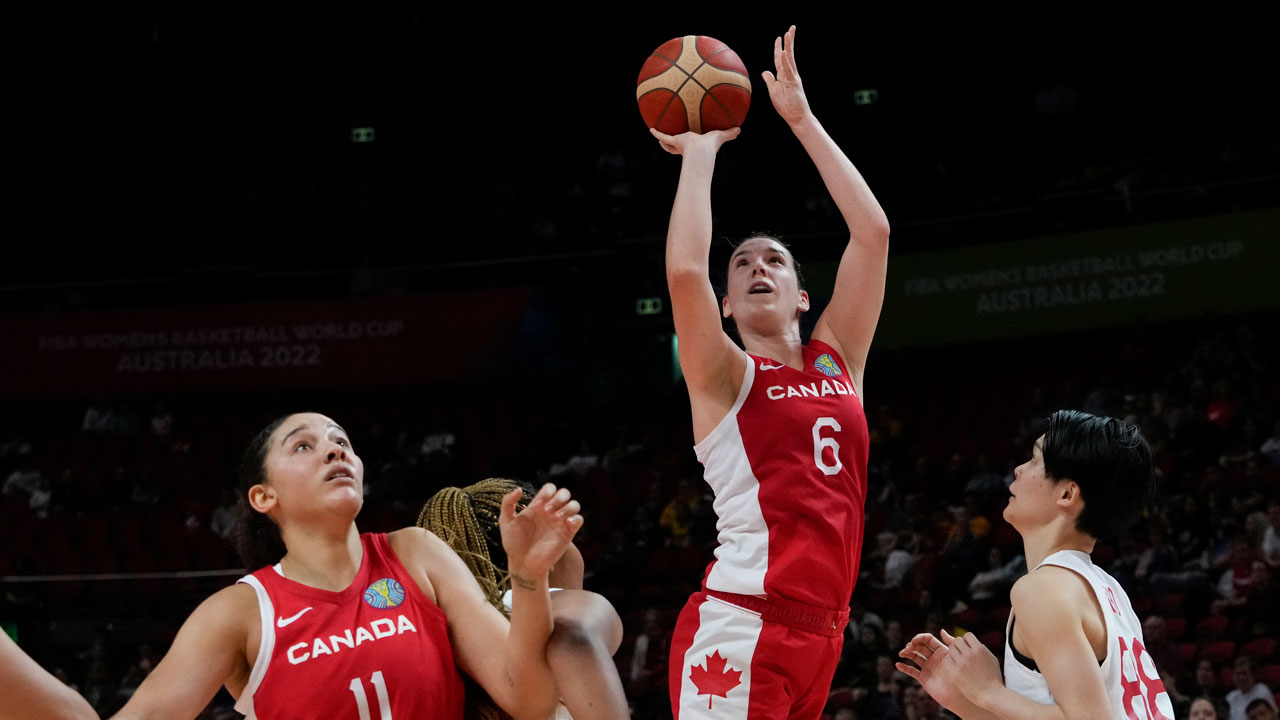
Bridget Carleton netted a game-high 19 points and pulled down six rebounds as Canada punched its ticket to the quarterfinals of the FIBA Women’s Basketball World Cup 2022 with a 70-56 victory over Japan.
The win improved Canada to 3-0 during the round robin phase of the tournament as it now leads Group B outright with six points.
Canada’s win over Japan was revenge of sorts for a defeat during World Cup qualifiers in Osaka, Japan earlier this year, when the Canadians blew a 20-point lead only to lose in overtime.
“That was a big game for us,” Carleton said after the game. “We played Japan in February, we were up by a lot and they ended up forcing it to overtime and we ended up losing. So, that was kind of in the back of our minds today.”
Carleton went 8-for-14 from the field, including shooting 2-for-5 from deep, breaking out of a slump that saw her score just 12 points on 4-of-20 shooting in Canada’s first two games combined.
“[It was] definitely good to come away with the win,” she said. “And it felt good to see some shots go in for me.”
Maki Takada led Japan with 11 points as the usually free-wheeling, three-point bombing Japanese side was stymied by yet another strong Canadian effort on the defensive end. Canada held Japan to 32 per cent shooting from the floor and a dismal 17 per cent clip from outside.
Up next for the Canadians will be an encounter with host Australia Monday at 6:30 a.m. ET, a pivotal matchup that could very well end up determining who wins the group. The world No. 3 ranked Australians were initially expected to win the group coming into the tournament, but their opening-game loss to France opened the door for another team like Canada possibly take top spot.
Here’s a few more takeaways from another Canadian win at the World Cup.
Canada punches ticket to quarterfinals in impressive fashion
Canada has made it into the knockout round in the fewest possible games, a praiseworthy feat, for sure, but even more impressive is the road it took doing it.
Though certainly not a slouch as the No. 4 ranked program in the world, Canada has still had a killer path so far beating the likes of No. 10 Serbia, No. 6 France and, now, No. 8 Japan, a team that also happened to capture the silver medal at the most recent Olympic Games.
Those are three quality wins back-to-back-to-back and have shown Canada to be a force to be reckoned with early on through the tournament and has given Canada growing confidence in itself.
“It’s great to be 3-0,” Carleton said. “I wouldn’t say it exceeds our expectations. Every game we go into we think we can win. We think we should win. Our goal is always to be on the podium, so this is exactly where we want to be, 3-0.”
An added bonus Canada’s got for itself by reaching the quarters so quickly is this guarantees that it won’t see the No. 1 ranked United States in its opening elimination-round game. Like, Canada, the U.S. locked up a quarterfinal berth and sits atop of Group A with a perfect 3-0 record.
Hounding defence in second quarter breaks game open
The Canadian defence was outstanding yet again, but unlike the shutdown job in the halfcourt that was seen against Serbia and France, in its game with Japan, Canada’s defence showed a different defensive look in order to slow down the Japanese quick-strike attack.
Canada went on 13-0 run to end the second quarter, breaking the game open and allowing it to cruise to victory in the second half. This was sparked mainly by the substitution head coach Victor Lapena made midway through the frame to bring in sparsely-used guard Sami Hill, whom he had pick up full court in an effort to disrupt Japan’s offensive flow.
It ended up working as Hill’s quick feet and relentless on-ball pressure rattled the Japanese ballhandlers, allowing Canada to create some turnovers and get easy baskets that helped turn the game in Canada’s favour.
“I don’t know if it was the key of the game, but it was important,” Lapena said. “Sami has a very special energy … when we need energy on the court, we need Sami. And so, that was my decision.”
Canadian offence breaks out
Canada’s contest against Japan proved to be its best offensive performance of the tournament so far.
The defence has been the main spotlight, but the Canadians were sharp offensively in the game as well.
Of course, Carleton’s breakout performance certainly helped, but the 70 points Canada put up was the most it’s done so far and the 30-of-69 shooting performance from the field proved to be both the team’s most made field goals and field-goal attempts so far.
More importantly, was the apparent offensive process with players hunting for better matchups and looking to get the entire team involved more often than not. This was most apparent in the play of 21-year-old forward Laeticia Amihere, a rising star of the program who’s contributions to the senior team have mostly lied in her ability score and rebound, she seemed to unlock another aspect of her game against Japan, dropping five dimes to go along with the 10 points and six rebounds she also tallied.
Those five assists Amihere racked up was a game high and revealed a high-low game among Canada’s bigs that wasn’t apparent before, another area of attack that the Canadians might be able to go to as the tournament progresses.







